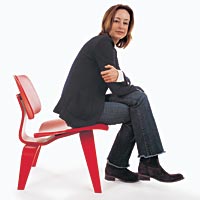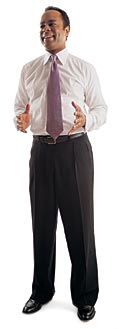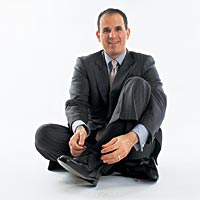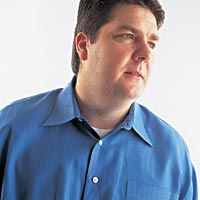 |
Mary Drolet
Founder and CEO, Club Libby Lu
Making it: Mary Drolet was driving her daughter to yet another of her friends' birthday parties when she had her eureka moment-an idea for an interactive combination playroom and retail store where young girls could play princess, make their own bath gel, buy glitter-covered clothes, and, of course, throw birthday parties. Drolet's epiphany dovetailed with her desire to start her own retail business, using her more than 20 years of experience with Montgomery Ward and Claire's Stores. In 2000 she founded Club Libby Lu, named for her childhood imaginary friend. Just three years after opening the first store, Drolet was again a corporate employee: Saks bought the chain from Drolet and her partners for $12 million and left her in charge. "I think if you talk to any entrepreneur who divests or sells, the number one concern is losing control," she says. "But it is all part of growing a business." The partnership has allowed Club Libby Lu to expand to 57 stores nationally (not including 26 kiosks inside Saks-owned department stores), with $30 million in sales last year.
On being an entrepreneur: "I never felt so stupid in my whole life. Having been a merchant and a marketer, I had to learn about insurance and store buildouts and point-of-sale systems. That first year I pushed myself to learn everything I did not know."
Grooming princesses: Some have knocked the idea of encouraging girls to aspire to be princesses, but the critics miss the point, Drolet says. "We hope that girls walk out of the club feeling ten feet above the ground, feeling that they are the cat's meow," she says. "That's what this concept's all about." Drolet says trips to the club can be used to celebrate a good report card or other achievement, in addition to birthdays.
Kids count: Drolet, 42, doesn't care to dwell on the impact her success has made in her life, preferring instead to focus on her family. "When you come home after a tough day and your daughter gives you a big hug and tells you about her knee socks, it helps keep your priorities in line," she says. While Drolet's daughter has been a big part of the club's business model, her son has a different take on Mom's place of work: "He runs into the store, straight to the candy section, and runs out as fast as he can."
 |
Quintin E. Primo III
Chairman and CEO, Capri Capital Advisors L.L.C.
Making it: Quintin Primo was disappointed when the first real-estate investment company he founded went belly-up in the late-eighties commercial bust. "Failure is not something they teach you about at Harvard Business School," he says. But rather than slink back to the corporate ranks-he had spent a decade at Citicorp early in his career-Primo decided to try entrepreneurship one last time. Capri Capital Advisors, the company he cofounded in 1992, is now a blazing success, with more than $2.7 billion in real-estate assets under management. The company has prospered, he says, by "seeking opportunities that our competitors do not." That means investing in apartment buildings, shopping malls, parking garages, and other properties in markets that are undervalued. In February, for example, the company bought Baldwin Hills Crenshaw Plaza, a shopping mall in Los Angeles's crime-ridden South Central district. Although the mall caters to a lower-income clientele, sales there average $500 per square foot, Primo says, compared with a national average of $350. "I as well as many in my organization grew up in communities like Baldwin Hills," says Primo, 51. "We are not afraid to go to Crenshaw and Martin Luther King [Jr.] boulevards. We understand that these communities are underserved and that there is significant demand [for retail]."
Giving it away: "One of the most important reasons to make money is that it gives one the ability to give more," Primo says. The Lake Forest resident and his wife, Diane, who recently retired as CDW Corp.'s chief marketing officer, support causes ranging from Roosevelt University and Luna Negra Dance Theater to Episcopal Charities and the African American Legacy Initiative. Primo is also on the board of the Chicago Community Trust and the University of Chicago Hospitals. But he is most proud of the Primo Center for Women and Children, a West Side transitional homeless shelter founded by his minister father 25 years ago. "We are changing lives one family at a time, and we are doing it in a very spiritual, supportive, nonjudgmental fashion," says Primo, who is overseeing a multimillion-dollar fundraising campaign to expand the shelter. "One of the smartest things they ever did was put my family name on it, because I cannot ever leave."
Keeping perspective: Primo isn't concerned about wealth spoiling his nine-year-old daughter and four-year-old son. "Being African American, you cannot escape poverty," he says. "It is part of the culture. There is not a single African American in this country who does not have a relative who is poor."
 |
David Kalt
Cofounder and CEO, OptionsXpress Holdings Inc.
Making it: Six years ago, David Kalt and his two partners founded a company that Barron's has rated as the best online brokerage in 2003, 2004, and 2005. As its name suggests, OptionsXpress specializes in options trading rather than offering it as a sideline, as most of the older brokerage houses do. That focus and a catering to "the sophomore investor"-neither novice nor professional-have attracted 160,000 customers and generated pretax margins of 64 percent. Last year, Kalt and his team took the company public. Kalt's 5-percent stake is currently valued at $80 million.
Passions: Music is not just a hobby for Kalt; it permeates his work life as well. "When I think about my DNA, it is hard to separate my personal and my business interests," says the 38-year-old. "I have long been a proponent of jazz and bebop, and so has my partner Ned [Bennett]. When you think about music structure, there are four beats, but within that structure you are able to improvise. Each of our employees has an instrument to play in that structure. We try not to micromanage." At home on the city's North Side, Kalt is building a recording studio for use with his three young daughters. Jam sessions include piano, guitar, and drums.
Perks: "One thing really nice about this business is that we were able to get our families to invest," Kalt says. "There was tremendous wealth creation for our investors." With his father-in-law, Kalt is using some of the windfall to establish the Simon Family Professorship in Orthopaedic Surgery at the University of Chicago. "As you have success, it is really easy to write checks," Kalt says. "It is more challenging to find ways to add value. I'm trying to find places where I can have influence, not just for my check."
Having financial security: "Things that you used to stress out about, [like] focusing on the next paycheck, become less burdensome. Then you have more time and mental resources to apply to other things. There is also an obligation to find ways to expand this business, to help other entrepreneurs, to give back in that regard. That is the fun part."

Katrina Markoff
Founder and Owner, Vosges Haut-Chocolat
Making it: Katrina Markoff was a student at the famed Paris culinary school Le Cordon Bleu when she was first "overcome by chocolate," she says. It was a dessert made with chocolate ganache at a restaurant near the Place de Vosges. Markoff borrowed the name of the location when she and a partner launched a gourmet chocolate company in 1998; soon her imaginative pairings, such as wasabi-laced chocolates, caught the attention of editors at Food & Wine, and the company was on its way. With revenues growing by 50 percent a year, Vosges became profitable in 2002, the same year Markoff bought out her partner and became the company's sole shareholder. She expects revenues for 2006 to surpass $10 million.
Funny about money: Markoff, 33, admits to being somewhat schizophrenic with her finances. "In my personal life, I spend everything I make," she says. "But with Vosges, I never take the profits. I never take a bonus at the end of the year."
Keeping secrets: In 2003, Markoff decided it was time to open her own retail shop in New York City's SoHo neighborhood. But, worried that her accountant would blanch at the $18,000-a-month rent (compared with the $5,000 Vosges now pays on Michigan Avenue), Markoff didn't tell her. "You have to sell a lot of $2 chocolates to pay for that," Markoff says. "When I did tell her, she said, ‘Are you crazy?' But that store was profitable within a year and a half, and it is what launched the brand to another level. That's when a lot of the international business really started to happen for us."
Escapes: Markoff, who is married with no children, rarely takes a day off, but when she does she really gets away. Last summer she won second and third place honors in a Lexington, Kentucky, horse jumping competition (she stables her horse in Wauconda). And when Markoff, who has had her pilot's license since she was 19, needs some alone time, she revs up a Cessna 172 and takes it skyward.
Pursuing alternatives: Markoff is turning in her Mercedes for a hybrid, a Prius.
Having money: "It is stressful when you don't have money, but it is stressful when you do. You want to keep it, but not be ruled by it. I believe if you go where your heart leads you, the money follows."
 |
Marcus Lemonis
Chairman, CEO, and cofounder, FreedomRoads LLC, Lincolnshire
Making it: It wasn't just any family that adopted Marcus Lemonis from a Beirut orphanage when he was nine months old. His father and grandfather ran the largest Chevy dealerships in Miami and Tampa. After graduating from Marquette University, in Milwaukee, Lemonis returned to Florida and started selling cars at his grandfather's dealership. At 22, he made a failed run as a Democrat for an open state representative's seat in South Florida, then chose not to rejoin the family business. "I decided that if I wanted to be successful, I had to get beat up, learn from others rather than from my family," Lemonis says. He took a job at AutoNation, the country's largest car dealer, and worked his way up to regional manager. Then he took some advice from a family friend, Lee Iacocca (the former head of Chrysler Corporation), who told him the path to long-term success lay in finding an industry that was ripe for transformation. Lemonis sniffed opportunity in the fragmented recreational vehicle industry. At the time, most RV dealers were small independents who typically sold only one brand and offered poor customer ser-vice. Lemonis poured most of his limited savings into a business plan, inspired by the AutoNation model, for a national chain of RV dealers that sold and serviced multiple brands. His new company, FreedomRoads, began buying up independents and, in less than three years, has become the country's largest RV dealer, selling 18 brands and racking up more than $1.5 billion in revenues last year.
Sharing the wealth: Success allows Lemonis, 32, to leave the office early every Monday to teach Catholic education classes for sixth graders at a local church.
All in the family: When FreedomRoads managers come to town for business, they stay at Lemonis's house in Lake Forest rather than at a hotel. He and his wife (who have no children) like to do the cooking. "Some people say they would not have their employees to their house," Lemonis says. "But I don't understand why. [Your employees] know you don't live in a shack. There's nothing wrong with success, and I think it can motivate people to say, If you work hard, you can have this."
Splurges: Today, one of Lemonis's few personal bows to extravagance is a Bentley. (The other is his 2,000-square-foot closet to house his wardrobe.)
Keeping perspective: Although he doesn't remember those early days in Beirut, Lemonis also can't forget: "When my parents came to that orphanage, they could have chosen anyone. It is a blessing that they chose me."
Josh Metnick
Chairman, Midwest Business; CEO, Chicago.com
Making it: When Metnick was 26, he and three friends sold American Information Systems, the Internet service provider they had started in their dorm rooms at the University of Illinois at Urbana-Champaign, for $20 million. Then Metnick acknowledged that with careful investing he "wouldn't need to work again." Instead, Metnick, who is single and now 32, has worked 60 hours a week or more ever since, founding Internet businesses and supporting the local e-commerce community. Midwest Business, formerly known as ePrairie.com, develops software to facilitate business networking (think of it as speed networking). In 2003 he joined Chicago.com, a search engine that provides Chicago-area information.
Mixing business with pleasure: Along with the actor Peter Dinklage (The Station Agent), Metnick is helping to finance the adaptation of a 1945 Swedish novel into a movie.
Changing names: In 2003, after his maternal grandfather died, Metnick had his last name legally changed from Schneider. He had always felt closer to the Metnick side of the family, and he wanted his grandfather's name to live on. "It was a quick decision, but it took a year to change it," he says. "Post–9/11, I had to do things like fax my passport to United [Airlines] to change my frequent flyer number. I feel for females who change their names when they get married."
Tough times: The bursting of the Internet bubble resulted in "some dark days" for Metnick, even if he wasn't worried about paying his own rent. Some of his other Internet ventures, including Guitar.com, which was born from his interest in playing the instrument, failed.
Sharing the wealth: Metnick contributes money to the National Multiple Sclerosis Society, a cause close to his heart because the disease afflicts both of his parents and an uncle. His donation to the Senior Center Computing facility at the Jewish Community Center in Northbrook is in the names of his grandfathers, who bought him his first computer at age nine.
Anthony A. Demasi
Founder and managing member, Tsunami Capital, LLC
Making it: After graduating from Georgetown University Law Center in D.C., Anthony Demasi went to work first for a large national law firm, then for a smaller boutique firm, where he practiced securities and commodity futures law. He liked the work, but it didn't satisfy his inner entrepreneur (his grandfather ran his own wholesale hardware business and once dammed a river in Michigan so he could sell the surrounding land as premium lakefront property). So Demasi struck out on his own, launching Tsunami Capital. The company offers legal and venture capital services, trades in futures, and launches and manages entertainment businesses, including the nightclub Reserve, the West Loop hot spot. Tsunami has about $10 million invested and has achieved returns of 68 percent and 56 percent in the past two years, Demasi says.
Burning the candle at both ends: Having a venture capital business and a nightclub means there is work that literally needs to be done 24 hours a day. Demasi has gotten good at delegating. But long hours have their rewards, in addition to the financial. Demasi, 31, is known for throwing after-hours surprise parties for friends, customers, and regular clients at the Park Hyatt, The Peninsula, and other swanky hotels. "I get a tremendous amount of pleasure from surprising people, entertaining people," he says.
On being a wealthy Gold Coast bachelor: "All the time, people are trying to set me up," Demasi says. He wants to start his own family eventually, but he's not ready now, even if being a bachelor is a disadvantage in the workplace. "People look at you as being a little less stable," he says. "But I can accept that."
 |
Mike Domek
CEO, TicketsNow.com, Crystal Lake
Making it: Mike Domek had spent three years at Southern Illinois University when he realized he was less interested in his studies than in his hobby: selling tickets to rock concerts, football games, and other events via an 800 number routed to his Carbondale apartment. Domek moved back to his McHenry County hometown of Harvard, used his last $100 to buy a two-line phone and a music-on-hold adapter, and in 1992 started reselling tickets he found through classified ads. Within seven years his operation had evolved into the Internet-based TicketsNow.
Today, his former hobby is one of the country's largest online ticket sales venues, with a 100-seat call center and more than $200 million in ticket inventory. The secret to Domek's success is that TicketsNow doesn't own any tickets. Instead, ticket brokers, whom the company screens to ensure they are legitimate, set the price for their tickets to sporting events, theatre performances, and concerts. TicketsNow charges the seller a 15-percent fee on the price of each ticket, and 10 percent to the buyer. In 2005 alone, revenues jumped from $50 million in 2004 to $150 million.
Measuring success: "I thought that when we hit $100 million, that would be success. But now that we just passed that, there's so much left to do. When we're a household name, that would be success."
What money buys: "I'm not focused on brand names. I'll buy a shirt if I like it, regardless of what it costs. I don't care if it is from Wal-Mart or a custom shirt from Nordstrom." Despite the couple's disposable income, Domek's wife, Amy, prefers to shop for the family (they have two children and one more on the way) at Wal-Mart.
What money can't buy: Most of Domek's close friends have been his buddies since high school. They play together on a softball team, sponsored by TicketsNow, and occasionally hop on a private jet Domek rents to go to a football game or rock concert. "These were and are true friends," he says. "They give what they can to me, and I give what I can to them, and we're all always appreciative of each other's generosity. We never lose sight of that."
Having financial security: "I feel less secure, because I can still screw it up," says the 36-year-old. "The company could still crash and burn. As you earn more, the stakes get higher."
Andrew K. Priester
President and COO, Priester Aviation, Wheeling
Making it: When Andrew Priester was as young as 13, his father began asking him and his four siblings if they were interested in joining the aviation company their grandfather had founded. Although Priester worked there at summer and after-school jobs sweeping out hangars and fueling planes, he opted instead to teach eighth-grade science. But after five years of teaching, he began to feel the pull of the family business. In 1997 he took what was to be a two-year sabbatical to help his father-"No one else in the family had gone into the business," Priester says-and has been there ever since. Priester took charge, selling off the fixed-base operations (things like hangar rental, fuel purchasing, and passenger services) and focusing only on charter flights for businesses and individuals.
"I changed the philosophy of the organization, but I did it with respect to my father's point of view," he says. In the wake of 9/11, with commercial aviation decimated, Priester Aviation was positioned for rapid growth. "The legacy and reputation my father and grandfather built made us one of a reasonably few companies people trusted," says the 34-year-old. That year, as many as 60 competitors could boast larger operations than Priester Aviation. Today the company is the fifth largest of the country's 3,000 or so charter operators, and it's still growing-revenues for the privately held company were up 57 percent last year, almost double the industry average, Priester says.
A different kind of flextime: People often ask Priester if he misses having his summers off as a teacher, but he contends his current position is better for balancing life with his wife and two kids. "When my daughter has a midday performance, I can schedule around that, go to her school, see the plays and the programs," he says. "When you teach and have 32 kids in fourth period, you can't leave."
Unexpected perks: Being a company president has some advantages over teaching. "I did not come in with a silver spoon in my mouth, but, for lack of a better word, this is a sexy business to be in," he says. "There is a different social aspect now. We get to enjoy the city more than we did in the past, attend nice events downtown. It is very rewarding from that aspect."
Oscar S. Tatosian
Co-owner, Oscar Isberian Rugs, Evanston
Making it: Oscar Isberian, Tatosian's grandfather, started selling Oriental rugs 86 years ago from a wheeled cart and later from his own store in Evanston. Since taking over around 20 years ago, Tatosian and his brother, Sarkis, have added stores in Highland Park and River North, increased sales by 40 percent annually, and boosted profits by eliminating middleman distributors in Europe. As early as age 16, Tatosian started making trips to Turkey, where he would buy rugs directly from weavers, and bring them back to sell without the distributor markup. The brothers now take buying trips to Nepal, Pakistan, India, and elsewhere as often as five times a year. Tatosian's favorite trips are to Armenia, his family's ancestral home (they immigrated to the United States from Turkey). "Armenia is an emerging market," says Tatosian, 44. "I used to have to take $30,000 or $50,000 in cash hidden around my waist because there were no banks. Now it is a free market and it is fascinating to watch that transition."
Defining success: "It is very elusive. I had a super month [in January]. The checkbook was fat; the bank account was really fat. I was driving back from [a customer's home in] Hinsdale at 8 p.m. and I thought I should really be at rest. When does it stop? Then it hit me: it is not the money; it is something else, a drive. If you have talents, you cannot just let them sit on the shelf."
Better to give: "I have a cousin who asked, ‘What is with you? Is it just about making money?' I said, ‘Hold it. I give my money away.' I shut him up, but more important, I got clarity for myself." Tatosian is actively involved with the Rehabilitation Institute of Chicago's board and with Lyric Opera of Chicago's associate board, but his favorite cause is the Armenian Church, for which he serves on the national board and has participated in overseas gift delivery at Christmas.
Fruits of success: After living in a loft above his River North store ("Like a baker lives. My grandfather did that, too: lived on top of the Evanston store"), Tatosian, who is single, bought the historic Reid mansion on Prairie Avenue for $1.5 million in 2002 and has spent the past three years restoring it. "I use it because I like to entertain," he says. "I do not need 6,000 square feet. It is just me and my dog [Lexie, a pit bull he rescued as a puppy]. She's pretty good on the rugs, but not as good on the shoes. She likes Ferragamos."
Photograph: Katrina Wittkamp


